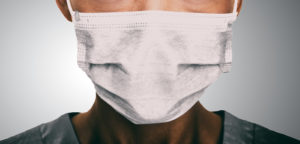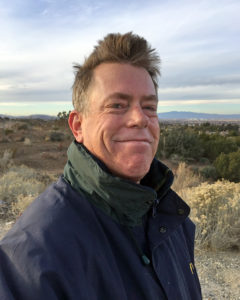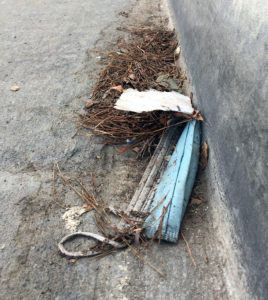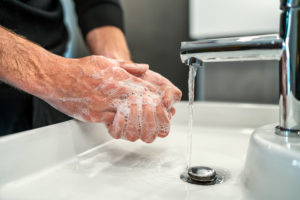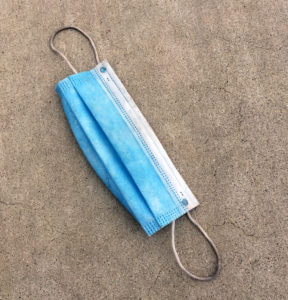Who is the most essential worker? YOU! Without YOU there would be no food on store shelves. Hospitals would have no supplies. There would be no gas for our cars. Restaurants that deliver would close. Vaccinations would not be available. The American trucker is the most essential worker there is. You need to be protected from illnesses and provided the latest information so you can stay healthy and keep this country running. With the dramatic increase in the use of personal protective equipment (PPE), many new challenges have arisen.
We are all wearing masks and other forms of PPE to stay healthy and constantly adapting to accommodate these challenging times. But are we doing it right? Ensuring your own safety and the safety of those around you should be your top priority as you travel across the country in your truck. As hospitals struggle to keep up with the increase in patients, we need to reduce possible transmission routes of illnesses any way we can and protect our environment.
Masks are being required everywhere we go and becoming a way of life. But what do we know about masks? We are told they keep us from exhaling large particles and getting others sick, but what if the masks can make things worse? Can we use them too long? Are there different and better types of protection? Are they bad for our environment? These are some of the important questions we should be asking that I will try to answer here.
We are now being told not to wear cloth masks because they do not provide enough proper protection. The masks we wear made of cloth, now sold everywhere, cost $5 to $10, depending on the design. A box of 50 disposable masks is about $10. Getting your cloth mask washed regularly is going to be difficult to do and easy to forget. For the time being, it seems that the disposable masks are the best option for your health. If you want to wear a cloth mask because of the weather or a certain logo on it, wear it over your disposable mask.
Most of the masks we are using are non-woven polypropylene, which is a plastic used to make rope and other products. The fibers are extruded very thin to make a great filter media, but can become a major pollution source for streams, rivers, lakes, and our oceans if disposed improperly. A recent beach cleanup picked up 61,000 masks off beaches in one day. Those small fibers enter our food chain and then we eventually consume the micro plastics without even knowing it. Once those plastics are in the ocean, we can’t get them back.
When we breathe into our mask, we put bacteria and whatever virus we may have into the filter material. If we properly disinfect our masks regularly or use new ones each time, we will be safe. If we reuse masks repeatedly, we increase the risk of getting ourselves sick. If you know you are sick you should NEVER reuse the same mask for more than one day.
When not wearing your mask, store it in a sealable bag to keep it clean. You can write the date the mask was put in use on it to make sure it is exchanged on a scheduled basis. Depending on the cleanliness of your environment and how often you wear your masks, I recommend that you clean or replace them every few days. When disposing your used masks, put them in a sealed bag with nothing else in the bag. People sifting through trash looking for recyclables can come in contact with your used PPE and get ill.
As you pump fuel or visit stores, protect your hands from contaminated surfaces. Fuel pumps are famous for being filthy with diesel and anything truckers touch (use your imagination), along with door handles and squeegees that see heavy use. Your pallet jack, door handles, lift gate controls, and your steering wheel should be cleaned often. Your hands should be cleaned before entering your truck. If you can attach a little hand sanitizer bottle outside of your cab somewhere for easy use, you might be more prone to use it. Be sure to clean your credit card before you put it back in your wallet, as well.
If you deal in cash, be sure to sanitize your hands after each time you handle money or wear disposable gloves, if possible. The things we handle often are the things we should be cleaning the most – like your cell phone and/or cigarette lighter. These items that get close to your face are the ones that can possibly get you sick. Going home to see our families is the best part of our lives. The last thing any of us wants to do is bring an illness into our home and get our loved ones sick. All these little things add up to a common sense plan for health and safety.
Pay attention to the products you clean your hands with. Some are at 99 percent plus effectiveness, but only with a prolonged contact time. Nobody has three or four minutes to wait while a product does its work. We have survived generations with just plain old soap and water and got through many flu seasons, but what we are experiencing now is proving hard to contain with our old methods of hand washing.
If you have staff members that need training, be sure to have an interactive session with hands on training that not only explains the lifespan, disposal, and proper fit of PPE, but also explains the purpose of each item. Knowing how to use something is one thing but knowing why will help support and increase proper use. Have a PPE exchange day to ensure old PPE is not used and is disposed of properly and get input from your team members to see if your program is being well-received and followed.
As you know, truckers are hardworking people with children at home that depend on them. As America depends on you to keep the country running, the health and safety of every driver has never been more important. The little things suggested here will help us stay alive so we can complain about it in the future!
~ Ken Beckstead is the inventor of the Butts Only Box® cigarette receptacle, which we have featured in the past. He has been in storm water pollution prevention for 20 years and teaches classes on the effects of cigarette waste in our water. His company, Cigarette Pollution Solutions, collects cigarette butts at various locations and recycles them by converting them into energy. Now, they are doing the same thing with used PPE. Ken can be reached at (760) 845-5285 or via e-mail ken@buttsonlybox.com. Visit their website at www.buttsonlybox.com.

